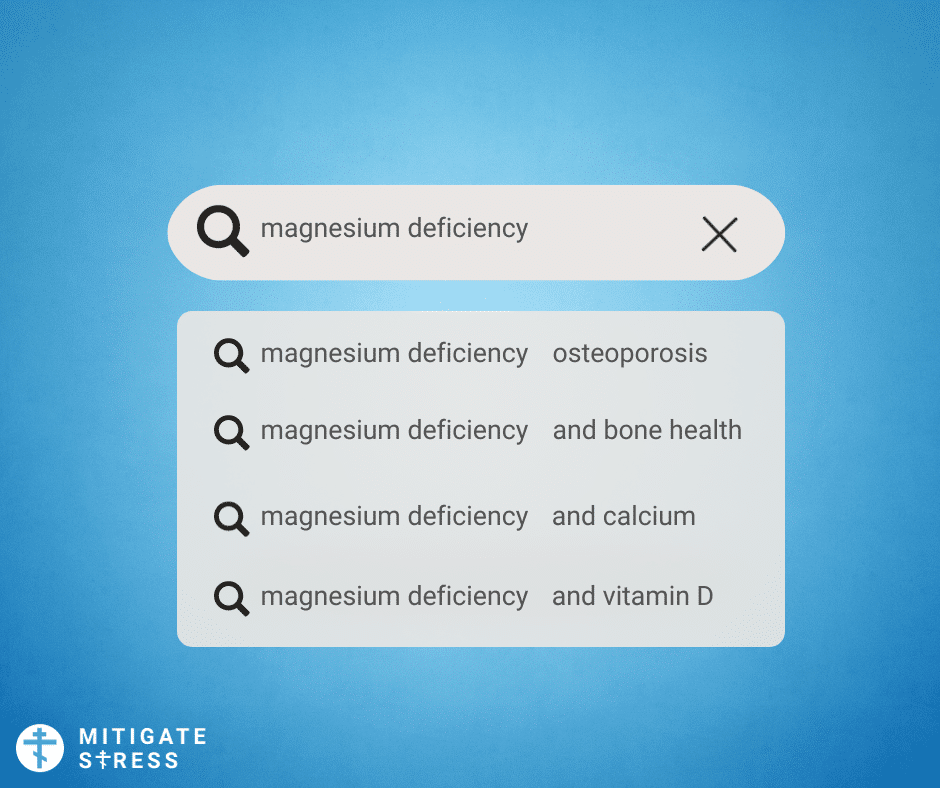Osteoporosis, a condition characterized by thinning bones and increased fracture risk, is a growing global health concern. While numerous factors contribute to osteoporosis, one often overlooked is magnesium deficiency. This article delves into the vital role of magnesium in bone health, its interplay with calcium and other minerals, and how its deficiency can lead to osteoporosis.
Magnesium: An Unsung Hero in Bone Health
Magnesium is integral to bone health, influencing the activity of osteoblasts and osteoclasts—cells responsible for bone formation and breakdown1. Moreover, magnesium aids in converting vitamin D into its active form, crucial for calcium absorption2.
A study published in the Journal of the American Osteopathic Association reveals that without sufficient magnesium levels, vitamin D cannot metabolize, impairing calcium absorption3. Research published in Nutrients further underscores the role of magnesium in crystal formation within bones4, highlighting that magnesium deficiency can lead to decreased bone strength and increased fragility, contributing to osteoporosis.
The Interplay Between Magnesium and Calcium
The relationship between magnesium and calcium is symbiotic. While calcium is necessary for strong bones, it needs magnesium to regulate its transportation and absorption5. An imbalance in these two minerals can lead to calcification or abnormal hardening of tissues, resulting in ailments such as kidney stones, arthritis, and osteoporosis6. Therefore, maintaining an optimal calcium-to-magnesium ratio is paramount for overall bone health.
Magnesium Deficiency and Osteoporosis
Numerous studies have linked magnesium deficiency to osteoporosis. Research published in the Journal of the American College of Nutrition discusses how dietary magnesium deficiency has been connected to osteoporosis7. Similarly, a study in Nutrition Reviews suggests that conditions associated with chronic magnesium deficiency are often linked to osteoporosis8.
Addressing Magnesium Deficiency
While the research underscores the importance of maintaining healthy magnesium levels for bone health, how can we ensure we’re getting enough magnesium?
Our magnesium bicarbonate products offer an easy solution to replenish your body’s magnesium levels. Similarly, our topical magnesium oil can be applied directly to the skin for quick absorption. These products supplement your dietary intake and provide a convenient way to address magnesium deficiency.
However, while supplementation can be beneficial, it should not replace a balanced diet and regular exercise. Always consult with a healthcare professional before starting any new supplement regimen.
Conclusion
The scientific exploration of the link between osteoporosis and magnesium deficiency has illuminated promising insights. By understanding their intricate relationship, individuals can take proactive steps to maintain a balance between these two essential minerals, potentially enhancing their bone health and reducing their risk of osteoporosis.
Footnotes
- Magnesium and Osteoporosis
- The Role of Magnesium in Vitamin D Activation and Function
- The Role of Magnesium in Vitamin D Activation and Function
- Magnesium and Osteoporosis: Current State of Knowledge and Future Research Directions
- Interactions between Magnesium and Calcium
- Calcium and Magnesium in Drinking-water
- Skeletal and hormonal effects of magnesium deficiency
- Magnesium supplementation and osteoporosis






0 Comments